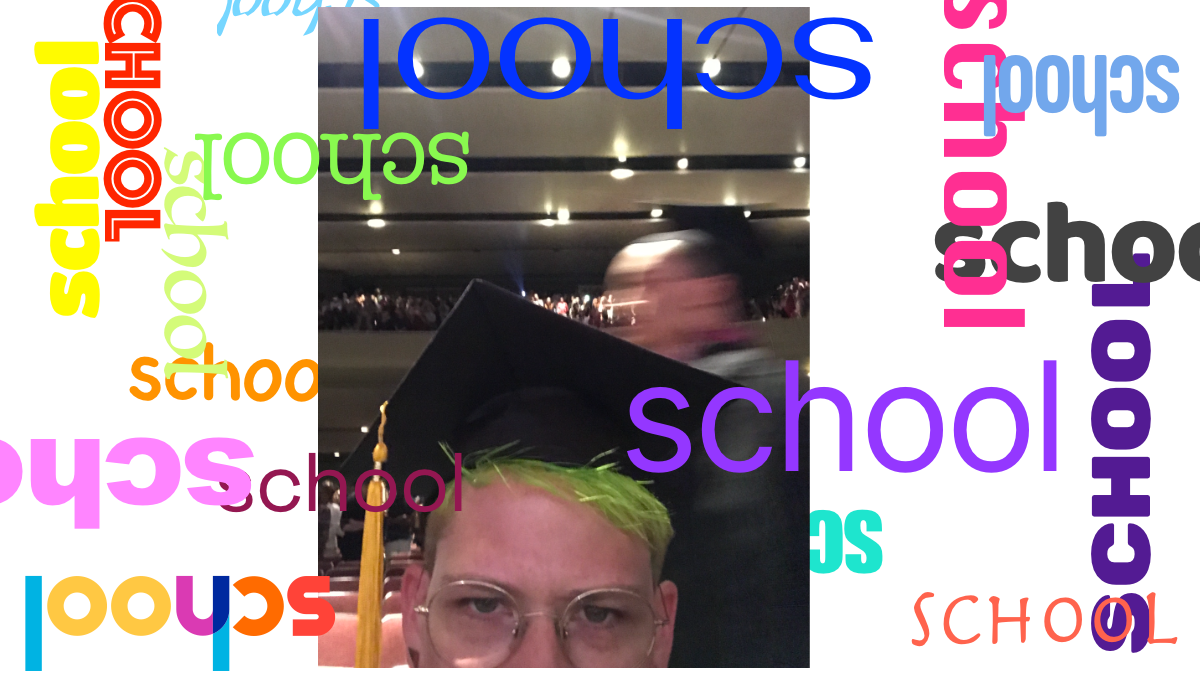🤓🏫 how to go to grad school 🏫🤓
The latest in the How To Be Creative™ series, we dive into higher education do's and don'ts.
This month’s How To Be A Creative™ entry is based on your vote for which subjects to explain and explore. Vote for the next subject at the bottom. Revisit older entries in the series, like How To Be A Creative, How To Run A Newsletter, How To Write About Art, How To Write For Social Media, How To Pitch, How To Decorate, and How To Give A Gift. To access, upgrade your subscription. Can’t upgrade at the moment? Reply to this message or send a private note and we can work something out 🌟
I went to grad school from 2017 to 2019, in the now non-existent MFA writing program at Otis College of Art & Design in Los Angeles, in the old IBM building right next to LAX. I biked to school three, sometimes four, days a week, riding down La Brea to Venice to Ballona Creek to Lincoln Boulevard. It was roughly 25 miles a day, which sounds like a lot but wasn’t that bad when you’re doing it so often. Plus? It was a fabulous way to see the city and not-drive, which kept me grounded and locked within my normal day-to-day life. Was that fun to do at 9P or 10P, late after classes or after a reading? Fuck no. Did it eventually ruin my knees? Absolutely. But would I do grad school again? Sure — but with some caveats, none of which has to do with the biking.
Grad school wasn’t necessary for me but I needed to spend some time studying fiction to officially shift my expertise from having studied acting and writing (for film, stage, short stories, etc.) to fully understanding the literary world, to learn how to write a book with the intention of coming out of the program with a manuscript. This was also after years of pushing against the ceiling of non-grad school education in writing, from writing classes in the early 2010s taught in someone’s house to night classes at UCLA. After my novel writing kept hitting dead ends, it wasn’t until multiple instructors said something to the effect of “You’re really good — but there’s nothing else we can do for you in this program.” that I realized I had exhausted all available resources. That, friends, is when and why I decided it was time to consider an MFA.
Before this, I was extremely anti-MFA and, in many ways, I still am. School in this age is a money laundering scheme that often squeezes you while offering very little help in getting you from A to B as far as profession outside of an institution. This is dependent upon the program — but also upon you, the student. Many people I went to grad school with and many people I know that went, are in, and want to go to grad school look(ed) to institutions to guide them but fall into financial holes via schools that do little for them. Unlike getting a pet that gives to you every day it’s alive, going to grad school should be something you think critically about because it tends to give you less than you put into it (unless you are truly out-of-the-know as far as an expertise). Unsurprisingly, this has been one of the most requested How To Be A Creative™ subjects, which is why we’re finally covering the matter. Let’s get into it, mapping what to do before (or when considering) going to grad school, what to do in grad school, and what to do after grad school.
Note that this is advice is largely for people considering higher education for, say, creative fields. This could be akin to an MFA primer.
Before grad school —
First: fuck grad school.
There’s something so obnoxious about the MFA and grad school system, one that wreaks of elitism and letting others put their fingerprints all over you. It’s simultaneously where creativity is born but also where others take your creativity and mold it in a way that’s no longer you. It’s a dangerous place! And it often gives you a false sense of talent, accomplishment, and identity: it’s not real life and you cannot convince yourself that it is, especially when personal finances are on the line. To consider grad school the real world — and to not question the system — is to be taken advantage of. That’s why I always tell people to think very seriously about grad school and alternatives. Could you get an apprenticeship? Do a fellowship? Get a mentor? What else can you do to learn or get the desired results? Do that first before you apply.
Second: get a job.
Unless you’re going to become a doctor — and even if you are going to become a doctor — never ever ever go straight from undergrad to grad school. You need to get a gd job! I say this because so many people I know and who I went to school with just jumped from school to school, undergrad to grad, without any experience of life outside the confines of academics, which means their eventual escape from the education system means their life priorities and interests change dramatically because of real life and the economy shaping what you can and cannot do. So take at least a year to work in an area where you can pursue the things you like, perhaps even getting paid for it (a la: starting your career). This gets you to think critically about what you can do in life while learning what life wants to do with you. Get experience! Try shit out! Fail! Succeed! But going directly from school-to-school gives you a false sense of reality that only helps the school and loan organizations, while shielding you from reality. Don’t let your indecisiveness and fear line someone else’s pocket.
Pursue expertise without expertise.
Always try to do-the-thing you want without higher education. Meaning: I spent years writing on my own, working as a journalist and blogging for years and years before shifting my career “to writing.” And even then I didn’t go to grad school! I had been writing — for pay and not — for more than seven years before I went to grad school. Much of this has to do with the aforementioned: I took classes and classes and classes at local writing institutions, to figure out what my skills were and if I could do it myself. Eventually, a UCLA professor had to pull me aside and say something like “You need to go to grad school because this program can’t help you anymore.” I realized that, yeah, she was right. I did need to go to grad school. Even then, I tried writing the novel in my head for years but, in realizing I didn’t know how to “write a novel” despite research, I caved — but I didn’t immediately apply. Still: I had a specific need for higher education. If I didn’t have such a goal I wouldn’t have attended.
Have very clear ideas of what you want out of it.
I knew exactly what and why I wanted to go to school: I wanted to learn how to write a novel and I wanted to use my education as a means to become a part of a literary community. This meant I had two deliverables: I had to leave school with a completed novel draft and I had to have connections in the literary world. If I wasn’t going to get that, I wasn’t going to go to the program or pay anyone any money. But where to go? And why?
Talk to someone about it (especially professors).
Whether you’re looking to keep your life the same or upend it completely, talk to someone about wanting to go to grad school. I not only talked to Bobby and friends who went to grad school but I also reached out to professors at local schools, from Tom Lutz (who I knew from the LA art scene) to Peter Gadol (because I was interested in Otis — and ended up going there). I talked to people at other schools, I talked to people at low-residencies, and I generally explored what my options were and what people’s experiences were. I wasn’t desperate to go to school, no, nor did I consider doing something wild like online grad school (not that they’re “all bad,” etc.) but I socialized the idea and took notes on what the world gave back to me.
Keep reading with a 7-day free trial
Subscribe to The Trend Report™ to keep reading this post and get 7 days of free access to the full post archives.




